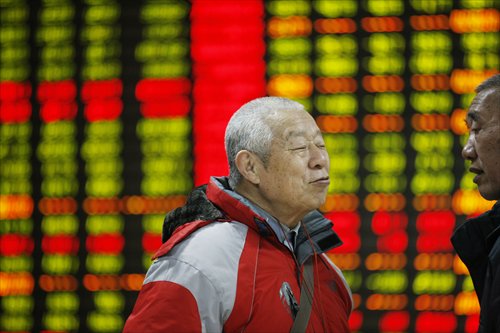Circuit breaker system will be improved: CSRC
Criteria for triggering mechanism could be relaxed, expert suggests

Investors check on stock performance at a brokerage in Huaibei in East China's Anhui Province on Tuesday. Photo: CFP
Following the market slump on Monday, the China Securities Regulatory Commission (CSRC), China's securities watchdog, announced on Tuesday that it would improve the circuit breaker mechanism and roll out new measures to manage stock selling behavior by major shareholders and top management of listed corporations.
The two markets in Shanghai and Shenzhen stabilized on Tuesday, with the benchmark Shanghai Composite Index slipping by 8.55 points or 0.26 percent to end at 3,287.7 points, while the Shenzhen Component Index fell 157.98 points or 1.36 percent to close at 11,468.06 points.
The two markets recovered from the steep fall that took place Monday, when the CSI 300 Index of blue-chip stocks in the two bourses tumbled by 7 percent, triggering the circuit breaker mechanism and resulting in a termination of trading during the afternoon session.
Lu Qianjin, a professor of international finance at Fudan University, told the Global Times on Tuesday that the CSRC's announcement had played a significant role in restoring confidence among domestic investors.
Ease the criteria?
Deng Ge, a spokesperson for the CSRC, said on Tuesday that the main function of the circuit breaker mechanism was to provide a "period of calmness" for the stock market. "Considering the situation on Monday, the circuit breaker mechanism exerted a certain level of influence," Deng said.
But he also said that the mechanism is completely new to China and therefore the market needs some time to adapt to it.
According to Deng, perfection of the circuit breaker mechanism cannot be achieved in a short period, based on the experience of overseas markets, but the CSRC will gradually improve the mechanism based on its operation in the two stock markets.
Zhu Haibin, chief China economist at JP Morgan Chase & Co, told the Global Times on Tuesday that the criteria for triggering the circuit breaker system could perhaps be eased slightly.
Under the current system, trading will be halted for 15 minutes if the CSI 300 Index rises or falls by 5 percent compared with close of trade on the previous trading day. If the index fluctuates by 7 percent or more, trading will stop for the whole day.
The government could raise these levels, "perhaps to 7 percent and 10 percent [respectively]," Zhu suggested.
"The circuit breaker mechanism should be a tool for calming stock markets in extreme conditions, when the markets undergo dramatic rises or falls. However, considering the degree of volatility in mainland markets in the past few years, fluctuations of 5 percent take place too frequently," Zhu noted.
Zhu also said the threat of a trading suspension could cause people to react to worries about liquidity in the market, pushing them to sell stocks before a suspension occurs, so the circuit breaker system should not be triggered too easily.
Liquidity worries
According to Zhu, a primary reason for the slump on Monday is that investors are still uncertain about liquidity in domestic markets and are worried about further capital outflows, given the recent instability in the yuan's exchange rate against the US dollar.
On Tuesday, the yuan's central parity rate against the dollar slipped 137 basis points to 6.5169, falling to the weakest level in nearly five years.
Also on Tuesday, the People's Bank of China, the central bank, injected 130 billion yuan ($19.9 billion) into domestic markets to replenish liquidity, the largest such injection since September 2015, the People's Daily newspaper reported on Tuesday.
Another factor that has caused liquidity worries is the imminent unlocking of a large number of shares on Friday, when major shareholders and top management of listed corporations will be allowed by the CSRC to sell their stocks, experts noted.
But the CSRC said it's not true that large-scale sell-offs will take place on Friday. "For one thing, those shareholders do not necessarily need to sell their stocks. For another thing, in recent years, more than 60 percent of the stock selling deals by major shareholders were achieved through means other than trading on the stock markets, such as transfer agreements," Deng said.
Also, for shareholders who do intend to sell their stocks, the CSRC will roll out measures soon to regulate their behavior, such as setting up a pre-disclosure system.
A number of major shareholders in listed companies such as Xiamen-based Kingdomway Group also announced on Tuesday that they would not sell their stocks for at least a year.